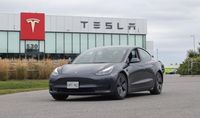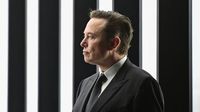Tesla, the electric vehicle and clean energy giant, has recently released its financial results for the first quarter of 2025, revealing a significant decline in revenue and profit that surprised analysts. The company, which boasts a market valuation of over $763 billion, reported a total revenue of $19.34 billion, down 9% from the previous year and falling short of analysts' expectations of $21.37 billion. This disappointing performance has raised concerns about the company's future prospects.
In the automotive sector, Tesla's revenue plummeted by 20% to $13.97 billion, while operational costs increased by 9% to $2.75 billion. The operational profit dropped a staggering 66% to $399 million, and the net profit saw a decline of 71% on a GAAP basis, totaling $409 million. Non-GAAP net profit also fell by 39% to $934 million, leading to a GAAP earnings per share of $0.12, down from $0.41 in the same quarter last year. The non-GAAP earnings per share decreased from $0.45 to $0.27, below the analyst consensus of $0.43.
Tesla's management has announced that they will review the company's outlook for the full year during the second quarter, a significant shift from earlier projections that anticipated a return to growth in 2025 after a decline in deliveries in 2024. The company had previously indicated plans to ramp up production, but the latest results have cast doubt on these ambitions.
In a live webcast held on April 22, 2025, the management team discussed these financial challenges and the factors contributing to the downturn. Analysts had already anticipated a difficult quarter, but the extent of the decline was more severe than expected. Tesla's webcast focused on the company's $97.69 billion revenue over the past twelve months, providing insights into its operational successes and financial health.
Despite the disheartening financial results, Tesla's stock remained relatively stable in after-hours trading, suggesting that much of the negative news had already been priced in following a previous sell-off. The stock only saw a minor increase of 0.72% to $239.68, indicating that investors may have been bracing for worse outcomes.
Analysts like Gene Munster from Deepwater Management have expressed concerns about Tesla's future profitability, predicting a non-GAAP earnings per share of $2.00 for the entire year, which is significantly lower than the analyst estimate of $2.62. This cautious outlook reflects broader concerns about the company's ability to meet its annual sales targets amid increasing competition and shifting market dynamics.
In addition to the financial challenges, Tesla has faced legal issues, recently settling a wrongful death lawsuit related to a 2021 accident in Ohio, although the terms of the settlement remain undisclosed. This legal battle adds another layer of complexity to the company's already tumultuous landscape.
Moreover, the automotive industry is witnessing a significant shift, particularly in China and Europe, where Tesla's sales have dropped nearly 50%. In Germany, new registrations for Tesla vehicles fell by 62.2% in the first quarter of 2025, with only 4,900 units registered. This decline has pushed Tesla to third place in the German electric vehicle market, behind Volkswagen and BMW, who have reported strong sales figures.
Experts attribute some of Tesla's struggles to a lack of innovation and the growing competitiveness of other manufacturers. The company's reliance on the Model Y, which is now seen as outdated compared to rivals, has raised concerns about its long-term viability. Critics have pointed out that Tesla's technology is lagging behind that of competitors, particularly in terms of production quality and innovative features.
Elon Musk's political activities have also cast a shadow over the brand. His close ties to former President Donald Trump, including a donation of over $250 million to Trump's campaign, have drawn criticism and may have affected consumer sentiment. Analyst Dan Ives from Wedbush Securities estimates that Musk's actions could permanently reduce Tesla's demand by 15% to 20%. This political involvement, coupled with the company's operational challenges, has led to a significant decline in consumer interest.
As Tesla navigates this challenging environment, it continues to prepare for the launch of new models in the first half of 2025, aiming to revitalize its offerings and capture market interest. However, the company must address its internal and external challenges to regain its footing in the highly competitive electric vehicle market.
In conclusion, Tesla's first quarter of 2025 highlights a critical period for the company as it faces declining sales, increased competition, and the repercussions of its leadership's political engagements. Investors and analysts will be closely monitoring the company's next steps as it attempts to adapt to these evolving market conditions.









